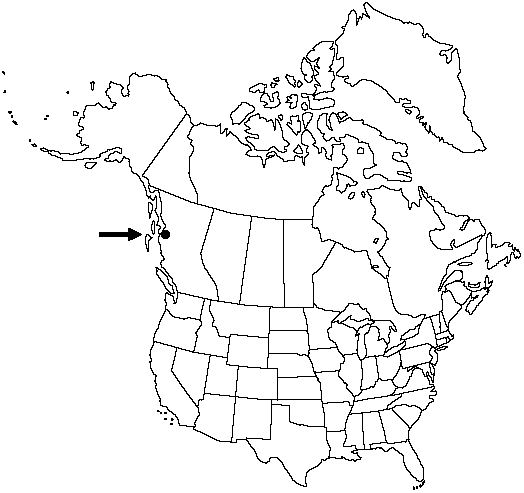Difference between revisions of "Polystichum kwakiutlii"
Amer. Fern J. 80: 50, fig. 1. 1990.
FNA>Volume Importer |
imported>Volume Importer |
||
| (7 intermediate revisions by 2 users not shown) | |||
| Line 6: | Line 6: | ||
|place=80: 50, fig. 1. 1990 | |place=80: 50, fig. 1. 1990 | ||
|year=1990 | |year=1990 | ||
| + | }} | ||
| + | |special_status={{Treatment/ID/Special_status | ||
| + | |code=E | ||
| + | |label=Endemic | ||
| + | }}{{Treatment/ID/Special_status | ||
| + | |code=C | ||
| + | |label=Conservation concern | ||
}} | }} | ||
|basionyms= | |basionyms= | ||
| Line 16: | Line 23: | ||
}}<!-- | }}<!-- | ||
| − | --><span class="statement" id="st- | + | --><span class="statement" id="st-undefined" data-properties=""><b>Stems </b>unknown. <b>Leaves</b> (only distal portion known) with bulblets present. <b>Blade</b> lanceolate, 2-pinnate, base probably narrowed. <b>Pinnae</b> narrowly lanceolate, ca. 2–7 cm, base truncate to oblique, acroscopic proximal pinnule enlarged, apex obtuse. <b>Pinnules</b> short-stalked, ovate-rhombic, acroscopic auricle ± well developed, margins finely spiny-dentate; apex acuminate; microscales filiform, lacking projections, dense abaxially, sparse adaxially. <b>Indusia</b> entire.</span><!-- |
-->{{Treatment/Body | -->{{Treatment/Body | ||
|habitat=Habitat unknown. | |habitat=Habitat unknown. | ||
|distribution=Of conservation concern;B.C. | |distribution=Of conservation concern;B.C. | ||
| − | |discussion=<p>Polystichum kwakiutlii is known only from the type specimen, collected at Alice Arm, British Columbia (whether referring to inlet or town is unknown). This species is presumed to be one of the diploid progenitors of P. andersonii. It should be sought among the boreal 2-pinnate polystichums, from which it can be distinguished by the presence of bulblets. Polystichum kwakiutlii differs from P. andersonii in its completely divided pinnae and entire indusia.</p> | + | |discussion=<p><i>Polystichum kwakiutlii</i> is known only from the type specimen, collected at Alice Arm, British Columbia (whether referring to inlet or town is unknown). This species is presumed to be one of the diploid progenitors of <i>P. andersonii</i>. It should be sought among the boreal 2-pinnate polystichums, from which it can be distinguished by the presence of bulblets. <i>Polystichum kwakiutlii</i> differs from <i>P. andersonii</i> in its completely divided pinnae and entire indusia.</p> |
|tables= | |tables= | ||
|references= | |references= | ||
| Line 30: | Line 37: | ||
-->{{#Taxon: | -->{{#Taxon: | ||
name=Polystichum kwakiutlii | name=Polystichum kwakiutlii | ||
| − | |||
|authority=D. H. Wagner | |authority=D. H. Wagner | ||
|rank=species | |rank=species | ||
| Line 42: | Line 48: | ||
|publication title=Amer. Fern J. | |publication title=Amer. Fern J. | ||
|publication year=1990 | |publication year=1990 | ||
| − | |special status= | + | |special status=Endemic;Conservation concern |
| − | |source xml=https:// | + | |source xml=https://bitbucket.org/aafc-mbb/fna-data-curation/src/2e0870ddd59836b60bcf96646a41e87ea5a5943a/coarse_grained_fna_xml/V2/V2_247.xml |
|genus=Polystichum | |genus=Polystichum | ||
|species=Polystichum kwakiutlii | |species=Polystichum kwakiutlii | ||
| − | |||
| − | |||
| − | |||
| − | |||
| − | |||
| − | |||
| − | |||
| − | |||
| − | |||
| − | |||
| − | |||
| − | |||
| − | |||
| − | |||
| − | |||
| − | |||
| − | |||
| − | |||
| − | |||
}}<!-- | }}<!-- | ||
-->[[Category:Treatment]][[Category:Polystichum]] | -->[[Category:Treatment]][[Category:Polystichum]] | ||
Latest revision as of 20:22, 5 November 2020
Stems unknown. Leaves (only distal portion known) with bulblets present. Blade lanceolate, 2-pinnate, base probably narrowed. Pinnae narrowly lanceolate, ca. 2–7 cm, base truncate to oblique, acroscopic proximal pinnule enlarged, apex obtuse. Pinnules short-stalked, ovate-rhombic, acroscopic auricle ± well developed, margins finely spiny-dentate; apex acuminate; microscales filiform, lacking projections, dense abaxially, sparse adaxially. Indusia entire.
Habitat: Habitat unknown.
Distribution

Of conservation concern, B.C.
Discussion
Polystichum kwakiutlii is known only from the type specimen, collected at Alice Arm, British Columbia (whether referring to inlet or town is unknown). This species is presumed to be one of the diploid progenitors of P. andersonii. It should be sought among the boreal 2-pinnate polystichums, from which it can be distinguished by the presence of bulblets. Polystichum kwakiutlii differs from P. andersonii in its completely divided pinnae and entire indusia.
Selected References
None.